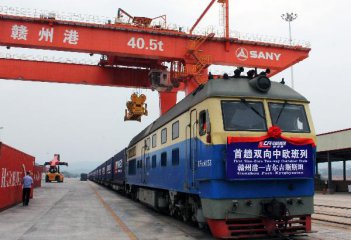Japan's government announced on Friday it would institute a new policy package in autumn aimed at propping up the nation's sensitive agriculture sector which might otherwise be negatively impacted by the recently agreed on Japan-European Union (EU) trade pact.
The envisaged policy package would be designed to offset potential losses facing farmers when the trade pact comes into force and the markets here become open to cheaper European food imports.
Raising the competitiveness of domestic produce such as local cheese, pork and beef has been floated as an integral part of the new policy initiative, so potential losses can be turned into profits by marketing attractively priced Japanese produce overseas, government officials said.
Japanese Prime Minister Shinzo Abe, addressing a cabinet meeting Friday, said the government would do all it can to alleviate the fears of those working in sectors that may be threatened by the trade pact and that the government would aid farmers to sell their goods in overseas markets.
"We will make the utmost efforts to dispel the concerns of people involved," Abe said.
The trade deal with the EU, in part, states that Japan will set up a low-tariff quota on European soft cheese, initially set at 20,000 tons, with the tariff quota to be removed 15 years after the deal comes into force, sources with knowledge of the matter said Friday.
They added that for items such as hard cheese including cheddar and gouda, Japan will scrap import duties after 15 years.
Livestock farmers, according to the new policy, however, will be able to cover losses made on lowering tariffs on beef and pork by way of a state grant system to be introduced.
Furthermore, facilities used to process timber and food will be made more efficient, the government said, to counter potential losses made on timber products, which will be subject to 10 tariffs in seven years.
Tariffs on certain European food items, meanwhile, will be scrapped after 10 years.
The government said that it would help support domestic farmers improve the quality of their output, while seeking to lower the production costs involved.
The government said it will also help with international marketing and branding strategies to ensure domestic goods favor well in overseas markets.
To bolster the potential loss-making sectors, the government said Friday that expenses to underpin these sectors will be allocated from both the fiscal 2017 supplementary budget as well as the fiscal 2018 budget.
Japan has long tried to protect its sensitive agricultural sector, some products of which sees tariffs of more than 700 percent imposed on foreign imports to protect the age-old sector.
Along with its highly-protected rice industry, Japan has also been looking to safeguard its wheat, beef, pork, dairy products and sugar industries, which has previously drawn the ire of other countries looking to ink trade deals with Japan.
With negotiations well underway between the 11 remaining Trans-Pacific Partnership (TPP) members after the withdrawal of the United States, the latest round of which concluded in the hot-spring resort town of Hakone near Tokyo recently, it remains to be seen whether Japan's powerful farm lobbies will remain compliant. Protecting what Japan deems to be its "national interests" was one of the key platforms for the ruling Liberal Democratic Party of Japan's (LDP) general election pledge.
Reneging on this pledge for the sake of the TPP or other trade deals, will likely draw a harsh backlash from Japan's powerful farm lobbies, from which Abe and the LDP derive a vast amount of political support.






















Latest comments